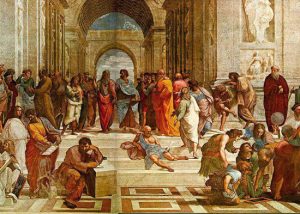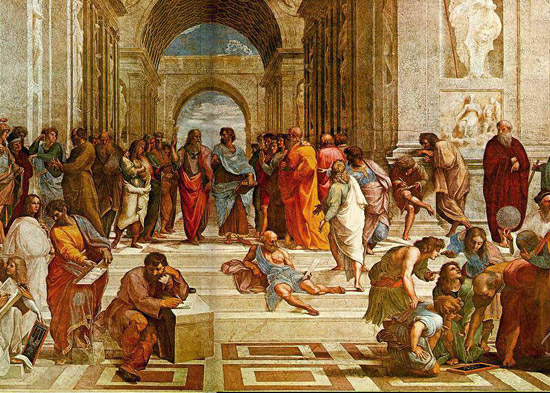
By FREDERICK COOKINHAM
On May 28, 585 B.C.E., there was a solar eclipse visible in Asia Minor. Aristotle tells us that this eclipse had been predicted a year before by Thales of Miletus, a scientist, a philosopher, and a hard-headed businessman.
The unusual thing about this prediction is that Thales made it on the basis of observation and reasoning, rather than by consulting omens such as the entrails of an owl.
How did he do it? Well, unfortunately, he did not have any insights into astronomy, or into the building of astronomical instruments. If he had, then he would have been able to predict the day of the eclipse and not just the year.

Thales of Miletus (c. 624 BCE – c. 546 BCE)
|
What he did instead was travel to Babylonia. There he found the records kept of eclipses and other events by Babylonian astronomers and astrologers (at that time they made no distinction between the two) for hundreds of years.
Thales realized that by studying this raw data he could find patterns. That is how our brains work; we look for patterns in the data provided by our senses. That’s why we humans love music and puzzles of all kinds. Thales could see that there was an eclipse every N years, and 585 would be an N year, ergo, there would be an eclipse.
Thales lived from about 624 B.C. E. to about 546 B.C.E. He was involved in politics, and ancient sources also tell us he once predicted a bumper crop of olives, and bought up all the presses he could find — which he then sold to the farmers when his crop prediction came true.
He may have been the first scientist to study electricity and may have written books on astronomy, but none survive. He may have been the first to propose the spherical shape of the earth, but no one is sure. We do know he did original work in geometry.
The unusual thing about this prediction is that Thales made it on the basis of observation and reasoning, rather than by consulting omens such as the entrails of an owl.
What Thales did with the Babylonian astronomical raw data was a tour de force of complete thinking: he used induction, followed by deduction. First, he induced from the data the generalization that eclipses occur at certain intervals, then he deduced that 585 would be the next year in that pattern.
People tend to become overly fond of one of those two operations at the expense of the other, and that does not work. The “intellectual,” especially, tends to be too deductive and not sufficiently inductive.
He creates a theory and then, like Pygmalion, he falls in love with his own creation. He starts predicting future events all over the place, based on his pet theory. Eventually something happens that his theory does not account for, and he gets all upset, because he is unwilling to amend his theory.
Thales’s successful prediction caused a wave of enthusiasm for science in Greece, just as Newton’s explanation of celestial motion caused a wave of excitement for science and reason in the western world of his day.
These triumphs for reason and science raised man’s hope for a philosophy that would likewise be based on reason — a philosophy that anyone could arrive at independently.
With such a philosophy, mankind would be liberated from the purveyors of religious revelations of truths that only they can know and the rest of us must take on faith.
Thales’s eclipse meant that every man could be his own scientist and philosopher. A distinction started to be made between religion, which tells you what to think, and philosophy, which teaches you how to think.
May 28 should, therefore, be celebrated as the birthday of reason by all mankind.
Remember crayoning and cutting out pictures in elementary school? If you are old enough, you might remember Captain Kangaroo on TV and his construction paper and safety scissors. Turkeys and pilgrims for Thanksgiving, and three ships for Columbus Day.
Imagine the child of the future, in every land and tongue, learning about Thales in first grade, and drawing pictures of solar eclipses. Then, in middle or high school, he will learn about induction and deduction, and about the deeper implications of Thales’s feat: the fact that anyone could make the same prediction, that we live in a universe of objective facts open to the understanding of all, and that no priesthood has an exclusive pipeline to truth.

